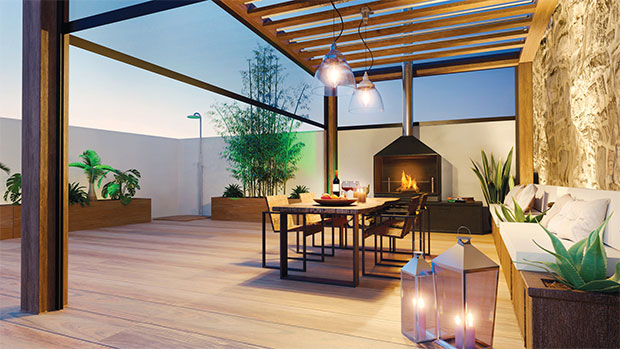A big part of building your dream deck is the planning. In fact, a typical deck project can take six months (or more) from inspiration to installation. To help make your dream a reality, the following are tips for keeping your deck project on track, on trend and on budget.
Visualize the possibilities
When it comes to your deck’s design, there are countless possibilities — from simple ground-level styles to more elaborate multi-level decks. Ultimately, a deck should be designed around how you plan to use it. In addition to function, consider your views, neighbors, the prevalence of sun or shade, as well as the entrances and exits from the home and into the yard. All these factors will have an impact on your deck’s size and configuration. Once you have a general design in mind, there are great tools available to help bring your visions to life. Trex offers an AR visualizer app that allows users to experiment with different decking shapes, board colors and railing combinations against the backdrop of your own house. There are also hundreds of downloadable deck plans and other resources available online to help guide you through your deck-building journey.
Consider codes and permits
Consult your state, county or city offices regarding building code requirements and to learn what permits are necessary for building a deck in your area. Factor permitting into your project timeline so that progress is not stalled by waiting for inspections and approvals. If your neighborhood has a homeowner association (HOA), make sure you understand any rules regarding deck size, color, product type or design. And don’t forget to check with your local utilities to locate any underground cables, wires or pipes before construction begins. Your deck builder should be able to help with this, or you can call the North American One-Call Referral system at 888-258-0808 if you plan to DIY.
Be mindful of materials
When choosing materials for your deck, think long term. It’s important to choose quality materials that will withstand years of wear and tear from both weather and use. High-performance, wood-alternative composite decking is resistant to fading, staining, scratching and mold. And, unlike wood, it never has to be sanded, stripped or stained, resulting in less maintenance and more time for outdoor enjoyment. High-performance Trex® composite decking is also sustainably made from 95% recycled and reclaimed materials, making it an ecoconscious choice that feels as good as it looks. Sample boards may be ordered online so you can see firsthand how different colors and collections work with your home’s architecture and style.
Budgeting and beyond
When it comes to budgeting for a new deck, keep in mind that several factors will affect costs, including the size, shape and elevation of the deck, along with labor and the materials you choose. For the latter, you can use an online cost calculator to get a rough estimate for material costs based on the size, substructure and decking products being considered. As for labor, do your research and request multiple quotes to ensure you find the best contractor for your project and budget. Keep in mind that quality deck builders book projects well in advance and often have a waiting list by spring.
With proper planning, it’s possible to make all your outdoor living dreams come true. For more information and inspiration, visit trex.com/academy.
This article is courtesy of Brandpoint.


